Old men and the sea: 100 years watching Gold Coast beaches
They’re saviours and social workers, but it’s the rescues you don’t see on the news that define these local heroes.
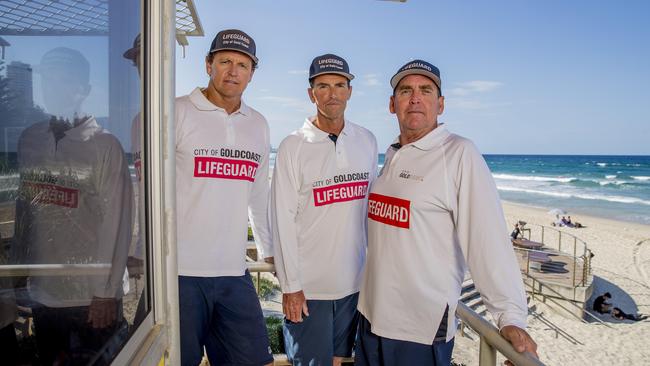
Beaches & Fishing
Don't miss out on the headlines from Beaches & Fishing. Followed categories will be added to My News.
It’s still not clear how three Gold Coast lifeguards could have known a gentleman had collapsed in a beachside park and their services were required.
But no sooner had their reluctant photoshoot ended when duty called. By the time a passer-by had run to the tower to call for a defib unit, one was already there, supplied by another lifeguard on the beach.
It wasn’t needed but it’s impressive to watch quiet professionalism in action.
The incident was discretely attended to while kids played oblivious in a nearby playground and people lazed in the shade of Burleigh Heads’ iconic Norfolk pines.
Despite the diversion, no one took an eye off the hundred or so people between the flags, or the handful swimming further up the beach outside them, all part of a meticulous back-up system that swings into action seemingly without anyone saying a word.
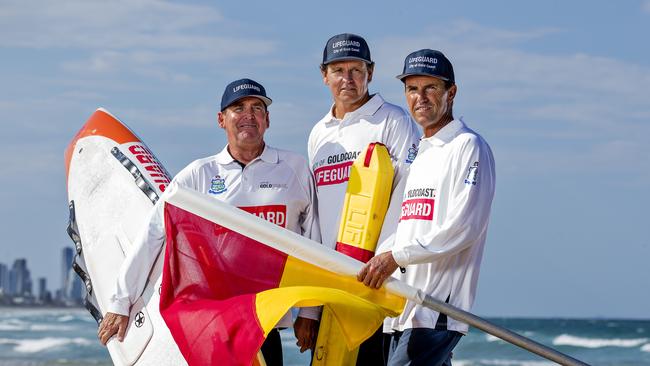
SEE BURLEIGH HEADS AND OTHER GOLD COAST LANDMARKS FROM THE SKY
Together, the three veteran lifeguards tapped on the shoulder for this story — Peter Ball, Anthony Lunney and Scott Franzmann — have clocked up almost 100 years on the beach. They’ve seen a lot — the park event probably won’t even earn a place in their memory banks.
One thing is clear after our post-incident chat: being a lifeguard entails a lot more than rescues.
Despite a touch of cliche, Peter probably says it best: “being a lifeguard is more than a job, it’s a lifestyle.”
Indeed, when you sign up for what sounds like an enviable working life on Gold Coast beaches, it’s understood you sign up for a life of health and fitness as well. There’s no such thing as coasting in middle age as some public sector workers may be accused of.
Gold Coast lifeguards are fitness tested every six months, put through their paces publicly in swimming, running and rescue board to ensure they’re up to the task.
With all the fine young athletes keen to put their hands up for a plum Council job, surely, in their 50s, they must feel the pressure.
“I think we all feel it,” Scott admits. “You can turn up on the day and the conditions might be a little bit difficult or you might be a bit underdone and you think it might be a bit interesting today.
“But at 5.30 in the morning when I don’t feel like getting out of bed and going to the pool to do my swim training, I know Warren (Chief Lifeguard Warren Young) will be there and I get up and go. The blokes older than us are great examples.”
“Yep,” Pete agrees. “The generation that came before us has taught us well.”
COAST BEACH NAMED ONE OF THE BEST IN QUEENSLAND
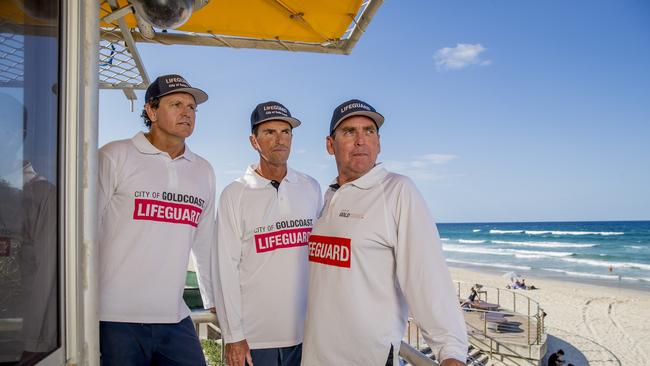
Certainly it’s hard to put a value on experience when it comes to the ocean. The three have pretty much seen it all: raging cyclone swells; the shifting banks, rips and holes that inevitably follow; mass rescues and the quiet ones where they are somehow the only people on a crowded beach who’ll see someone slipping into trouble.
They speak of a sixth sense; knowing what’s coming before it comes. Stopping it from ever happening is a big part of the job.
“A lot of it is herding people,” Peter says. “It’s like herding sheep. On bad days you’re on edge all day, just constantly herding people to keep them out of trouble.
“You do it so no one needs to be rescued but you come home as exhausted as if you did 20 rescues.”
GET FULL DIGITAL ACCESS FOR 50C A DAY
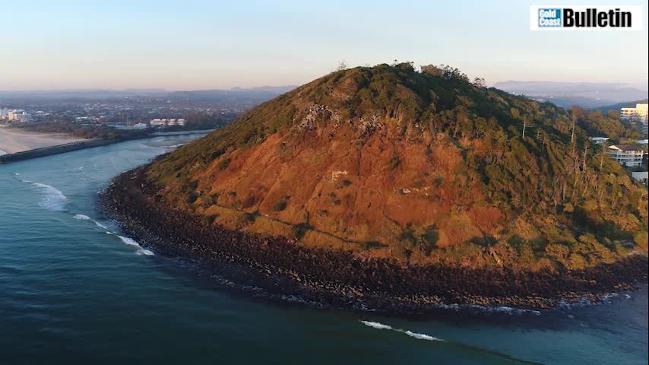
Few would argue the Gold Coast has an enviable beach safety record for the numbers it accommodates. Surf patrols had historically been the work of weekend lifesaving volunteers but as year-round tourism grew, the City Council saw the need to provide weekday services.
The city’s first professional lifeguard was employed at Main Beach in 1935. As population and visitor numbers grew, the lifeguard service expanded with them, covering more beaches and taking on more professionals.
Today the City employs 39 permanent lifeguards and patrols 26 beaches year-round. The numbers are about to swell with increased services for the summer school holidays with an additional 140 staff taken on, mostly recruited from the ranks of Surf Life Saving volunteers, and patrols extending to 42 beaches.
It’s a big task to keep every single person on the 52 kilometre stretch of the city’s coastline safe but, as it turns out, that’s not all lifeguards have to do.
While it’s understandable they’re also required to be frontline city ambassadors, tourism advisers, unofficial police and keepers of lost property, they are perhaps less recognised for their social work.
The three acknowledge the role — there are a lot of people who come to the beach every day for the connection it brings them.
“You’re always there,” Anthony says simply.
BEST OF THE GOLD COAST: VOTE FOR THE CITY’S BEST BEACH
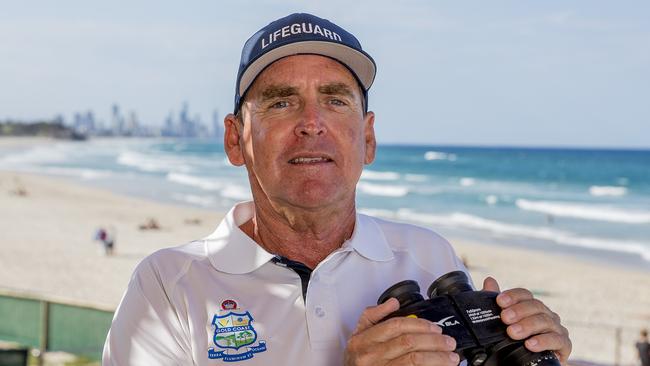
Anthony has been the lifeguard at Kurrawa for 22 years. He took over from the late Bill Eckstein, the father of surf lifesaving champions Shannon and Caine. Between the two of them, they’ve looked after the notoriously difficult stretch of beach for half a century or so.
Anthony and his locals have long known each other by name. Tourists who’ve been holidaying there for years regard him as an old mate.
“They say, ‘Are you still here, you old bastard?’,” he laughs.
All three have their stories of the people who seek them out for a talk on the beach: those who’ll just chat about the weather, others looking for an ear for their worries, some who’re just lonely.
Anthony tells of a woman who walked on the beach every day. She suffered from a long term eating disorder and was well-known for her daily routine of walking the streets and beaches of Broadbeach and Mermaid.
“You’d hear people yell out to her ‘have a steak’ but I got to know her over the years,” he says. “We were great mates. I thought she knew nobody and was lonely.
“I used to go and visit her and when she died I went to her funeral. I didn’t know if there’d be many there.
“So I went and there were 250 people there. She used to be a singer at Seagulls and she did back-up for some big names. I knew none of that about her. She’d never told me.”
Sometimes it can be difficult to provide the conversation people might be looking for, especially on those days when every shred of their concentration has to be on the water.
“Some days you have to keep it short,” Peter says. “There was one guy at Surfers when I was there and I’d say to the young blokes, remember you may be the only person he talks to today.”
NEW LIFEGUARD TOWER FOR THE GOLD COAST
But for all its social opportunities, lifeguarding can be a lonely job too.
There are runs of cold, windswept days when lifeguards must watch deserted beaches, even when they have been declared officially closed.
Ironically they can be the most dangerous days of all with people still choosing to go in the water or being sucked from the shoreline while walking; but there can be many quiet stretches in between.
“You do spend some long days with yourself,” Peter admits.
Which begs the question, what wisdoms have they discerned from their years of watching the sea?
“To respect the ocean,” Peter says. The others nod; it is always the ocean in charge.

Between them they have seen the array of local marine creatures at close quarters: dolphins, whales, sea snakes, stingrays, all manner of fishlife, jellies and stingers but, perhaps surprisingly, not too many sharks.
“I reckon I could count them on one hand,” Anthony says.
The others concur — and it doesn’t seem an elaborate city conspiracy to play down the shark menace on local beaches. There are just not that many that venture too close in.
“Whatever the shark netting and baiting system is off the Gold Coast, it works,” Anthony says. “It’s a good model for other places.
“Sharks are territorial. The system’s designed to keep them from setting up a territory close in. You still have to watch river mouths but we just don’t get that many of them.”
In their time on the job, they’ve also watched seasonal whale numbers increase year on year. Peter has had the rare experience of seeing a mother give birth.
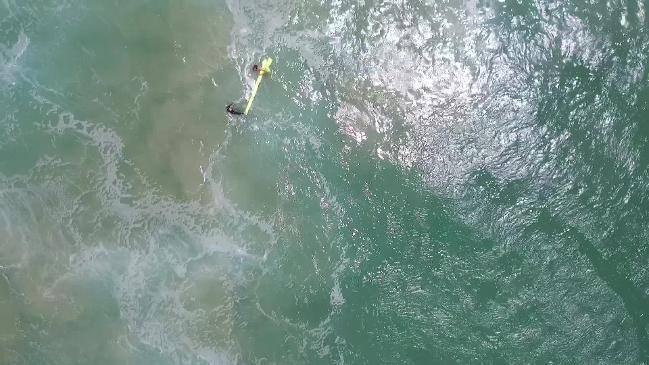
“There was a whale still for ages,” he says. “I was watching, thinking something might be wrong, and the next thing there was a calf alongside her.”
They’ve also seen their share of land-based animals turn up on the beach: swimming marsupials, cow carcasses after flood rains and other unexpected fauna.
“One time there, I was watching what looked like horns about a kilometre out to sea, just moving along,” Anthony says.
“I thought ‘what the hell is that?’ Next thing a deer body surfs into the beach. Who’d have known they could even swim?
“It started running along the beach. There was a woman walking along with her headphones in and she looked up and just freaked out.
“We called people in and they were trying to shoot tranquillisers into it but last I heard it was on TE Peters Drive.”
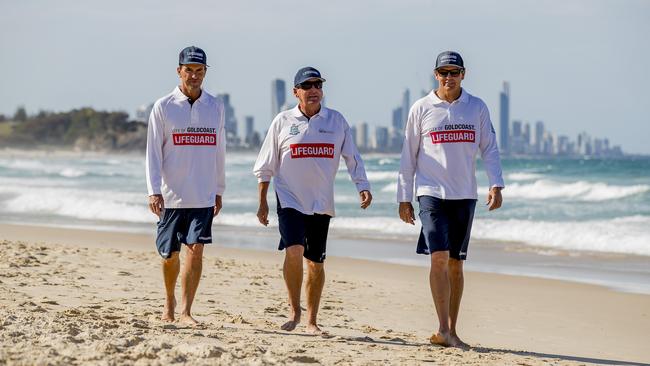
But for all the funny stories, of course there are the inevitable tragedies, the people they couldn’t save. That too is part of the job.
“You get the adrenaline dump when it happens,” Anthony says. “But it’s what happens afterwards.
“You handle it better over time and some are better at it than others. Some handle it badly. You don’t know how you’ll be until it happens.”
There are routine debriefings and counselling offered nowadays. Fortunately the tragedies have lessened over the years as the lifeguard service has filled the gaps in its pioneering tower surveillance system, but they will always be part of the job.
“We don’t always know the situation and you might find out later the person had a heart attack,” Anthony says.
“You didn’t get the best outcome but you know you did everything you could have done.”
They are the ones that make the news but there are hundreds of routine rescues that happen annually with no fanfare at all.
“They walk off and you never see them again,” Scott says. “We’re not looking for the accolades though.”
“It’s just what you do,” Anthony shrugs.
But in this age of disruption, where do they sit with new technologies that may replace old-fashioned eyes on water — camera monitoring, smart phone surf education technology targeted to beachgoers in their own languages, drones dropping flotation devices to stricken swimmers?
“They can all assist in some way,” Peter says. “But the basics of watching people in the water will never really change. No technology can replace that.”
Nor it seems the collected wisdom of 100 odd years on the beach.
So, here are some things to remember for the long, hot summer ahead: 99.99 per cent of lost children are not in the water; organised thieves operate on busy beaches; lost jewellery/ Go Pros/ false teeth/ hearing aids /bathing costumes may just wash up on a beach further up; there’s nothing that clears the water faster than a child screaming from a bluebottle sting and — does it even need to be said — always swim between the flags.
